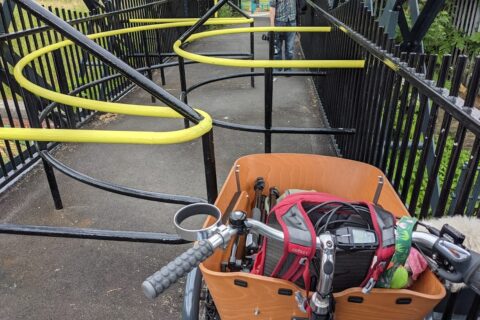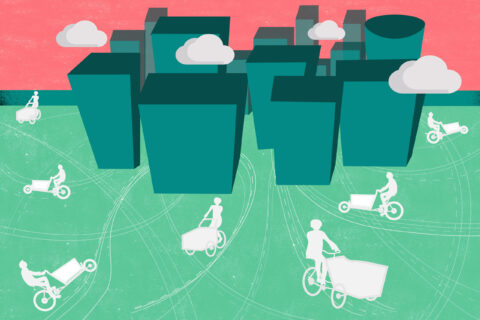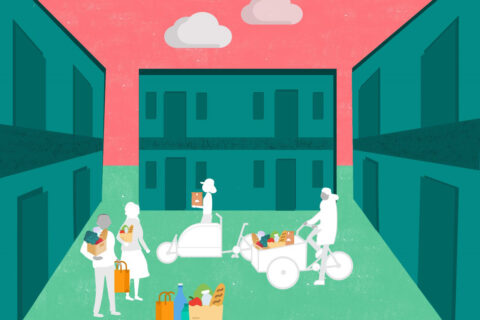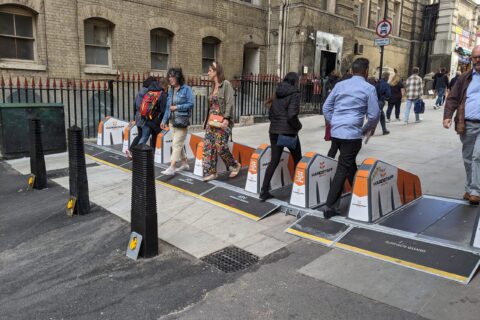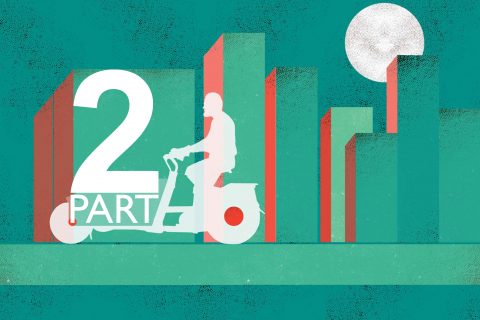How can young Londoners make more sustainable travel choices?
Fare City has been working with a group of sixth form students from Northolt High School since summer 2020. Our research provides us with a snapshot of what the needs, priorities and aspirations of young Londoners are for travelling in and around cities, both today and in the future.
In Part Two of Fare City’s two-part study working with Northolt High, we invited three students to tell us how they believe young Londoners can be encouraged to make more sustainable travel choices. We set the students a brief that focused on five key topics: lifestyle, responsibility, career opportunities, health and wellbeing, and independence. We then asked the students to choose and develop statements on these topics which they felt best described their views on travelling more sustainably in cities.
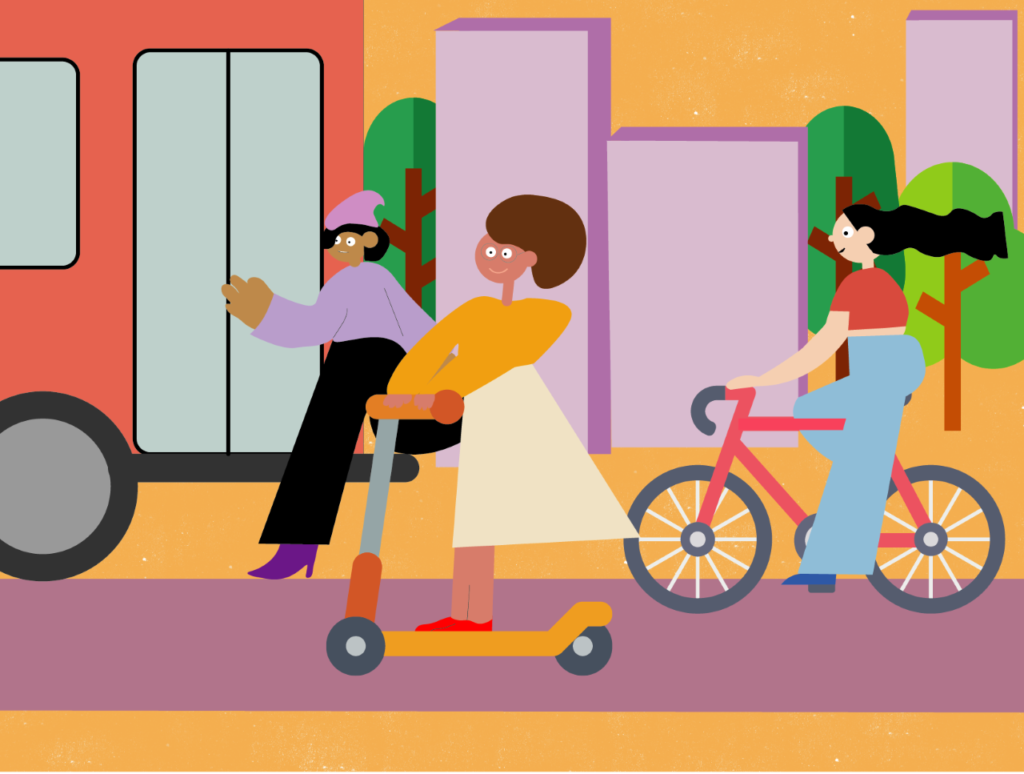
“Travelling sustainably is important for both my current and future health and wellbeing”
by Preyasi Naramoto
During the last year, the pandemic has meant that many Londoners have had more free time. This has provided a great opportunity to promote healthy habits, including more walking, running, and cycling – also known as ‘active travel’. More free time and COVID-19 restrictions have encouraged many young Londoners to stay socially engaged with neighbours and friends by going for a walk or cycle. This has reduced social isolation during a stressful time and has helped to support people’s mental health.
Travelling via active means has also been proven to improve the physical wellbeing of people, as it prevents them from developing diseases such as coronary heart diseases, diabetes, and obesity at a much younger age. This in turn increases the percentage of the population who live longer, healthier lives and decreases the risk of them developing diseases later in life. Seeing others around us walking, running, and cycling works to promote healthy habits and should be encouraged.
One way to promote more physical activity among Londoners is to encourage cycling. Studies have shown that cycling has been proven to reduce the relative risk of mortality by almost 40 percent, as it decreases the risk of cardiovascular disease and obesity. It also helps to increase general health, which results in further benefits – including lower absenteeism. It is important to change public perceptions about cycling being dangerous by promoting the message that its health and cost benefits outweigh the risk of accidents.
Travelling sustainably is not just about valuing personal health but also the health of others and the preservation of the environment. While many of us understand the environmental impact of climate change, fewer of us understand the ethical impact of climate justice. Studies have shown that the global south is much more susceptible to floods, drought, and forest fires than the global north – where the majority of carbon emissions originate from. It is therefore important to consider how the everyday choices we make may unfairly impact someone many miles away.
We live in a society where there is a growing level of awareness about the need to improve our habits; however, it seems that many of us lack the ability to be able to do so. As many young people are increasingly influenced by content appearing on social media, is there a way of using social media as a tool to promote the benefits of travelling sustainably, which include making it both more accessible and enjoyable? Doing so may not only improve young people’s physical and mental health but inspire others to join them – something which is especially important as we emerge from the pandemic.
“Sustainable modes of transport have to be made easier and more convenient”
By Bianca Mihalcea
As we get older, we must accept greater responsibility, which typically results in fast-moving and busy lifestyles. While we may want to choose the most sustainable options in the way we eat, the way we shop and the way we travel, this is not always possible.
Efficiency is a big factor in influencing the way that many young Londoners travel. While more sustainable modes such as walking and cycling may be healthier options, they are not always preferable. Safety is another big factor – especially if young people are to try more sustainable modes. Since the outbreak of the pandemic, many cycle lanes have been created on London’s roads. However, these are not always safe or ‘beginner friendly’ for new users, as there seems to be an emphasis on speed and assertiveness.
One option could be the introduction of programmes that aim to support both experienced road users and new road users. An awareness programme that relays the concerns of new road users to experienced road users could work to ensure that they are more considerate. A support programme for new road users could provide them with training and insight, which could help them feel more confident on the road.
Programmes such as this must be implemented. This is because younger people are increasingly aware of the problems associated with wasteful living and are therefore more likely to choose sustainable modes if they are made easier and more convenient. Travelling more sustainably is something that everyone should be able to do; however, it is up to organisations such as Transport for London to improve the safety and the accessibility of such options.
“Travelling sustainably will help me to become more independent”
By Kividi Batagoda
Travelling sustainably has many advantages, including promoting the importance of the environment, protecting our natural resources, and preserving the beauty of our planet. However, often overlooked is the opportunity it provides many young people to become more independent. I believe this is fundamental as it helps to boost our confidence, reduce stress, and give us a sense of accomplishment.
By walking, cycling, or using public transportation, we are much more likely to learn more about a new city, or even our own city, by developing our sense of orientation and gaining new experiences. Being able to walk or cycle somewhere will also mean that we don’t have to rely on public transport and private cars – such as cabs or a lift from our parents – which is a huge sign of independence.
Travelling sustainably to a destination often requires that we plan our journeys, which not only improves organisational and time management skills but increases our self-esteem. Furthermore, emotional independence promotes happiness and reduces stress and can be achieved by simply taking a walk outside or cycling in a park. Choosing either of these modes will also provide us with exercise and help to improve our health and wellbeing.
A final major benefit of travelling sustainably is that walking, cycling, or using public transportation is much cheaper than owning a car and can help to save money that can be used for our own interests – such as contributing towards a holiday. I believe that travelling sustainably is important as it has not only helped me to become more independent but has also given me the personal satisfaction of knowing that I am doing something positive to help protect the environment.
I consider that there are two ways in which we can encourage a greater number of young people to travel more sustainably. First, they should be presented with more opportunities, such as better walking and cycling facilities and more schemes and programmes which enable them to switch from other modes. Second, there needs to be greater awareness, which could be raised via government campaigns and social media to encourage young people to choose more sustainable transport options and realise all the benefits that come with it.
Fare City would like to thank the three students who contributed pieces for this article and Northolt High School for their assistance during the project.


